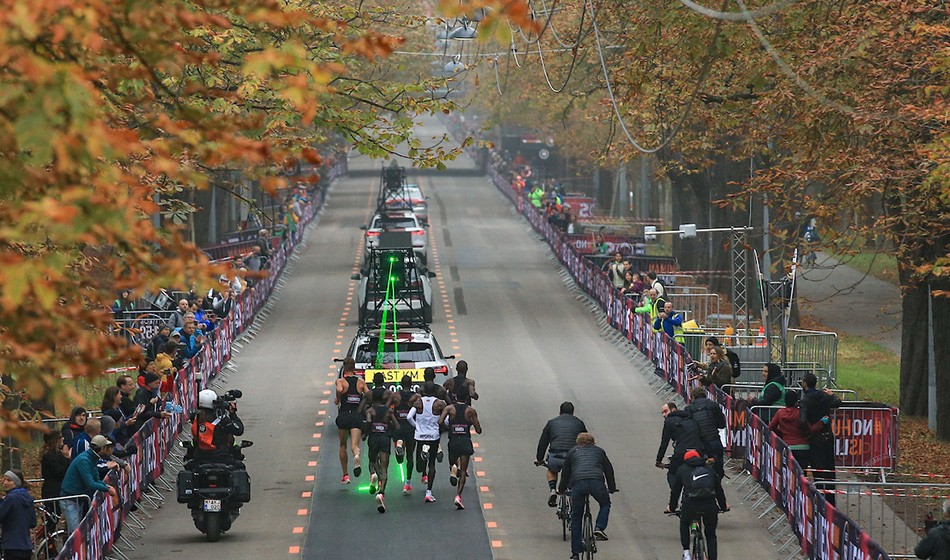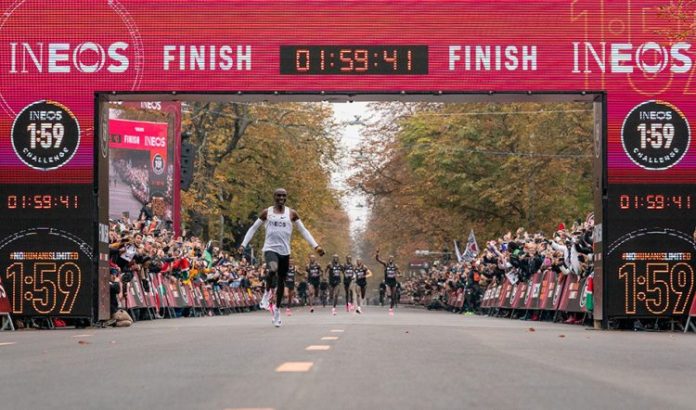
Five years ago, a Kenyan became the first man to break two hours for a marathon using his controversial methods
On October 12, 2019, Eliud Kipchoge made history by becoming the first person to run a marathon under two hours.
At the INEOS 1:59 Challenge in Vienna, Austria, the world watched in awe as the Kenyan clocked a stunning 1:59:41, an achievement once thought impossible, but Kipchoge made it look effortless.
As he raced down Vienna’s Haupltalee towards the finish line, the atmosphere was electric as the now 39-year-old pulled away from his pacemakers, waving to the cheering crowd in the closing stages.
“500 meters ahead,” the two-time Olympic champion later thought, “that was the best moment of my life.”

Eliud Kipchoge (Bob Martin)
For years, the two-hour marathon was labeled an “impossible obstacle” by experts, but Kipchoge’s feat was not without controversy.
The record run had a unique structure. a rotating team of pacers shielded Kipchoge from the wind while he wore Nike’s specially engineered carbon fiber boots. Given this, the IAAF chose not to validate it as a world record at the time.
However, the two-time Olympic champion still broke a barrier that was long considered impossible and has yet to be broken by anyone.
The event was created especially for this moment. Police cars cleared the roads ahead, while aides on bicycles handed out refreshments and a speedster led the way, setting the pace for Kipchoge and his elite pacemen, which included Bernard Lagat, Matthew Centrowitz and the Ingebrigtsen brothers.
His achievement reverberated throughout history and was compared to Roger Bannister’s legendary first four-minute mile in 1954.

INEOS 1:59 Challenge in Vienna
“It has taken a man 65 years to make history in sport since Roger Bannister made history in 1954. I tried and got it,” Kipchoge said five years ago.
“I’m the happiest person running under two hours to inspire people, to tell people that no one is off limits. You can do it.”
The triumph was not Kipchoge’s first attempt to break the two-hour barrier. In 2017, he came agonizingly close, finishing in 2:00:25 at Nike’s Breaking2 event in Monza, Italy. Unlike Vienna, Monza lacked the crowd that would later cheer it on to victory.
But following his official world record of 2:01:39 in Berlin in September 2018, Kipchoge entered Vienna with the confidence and preparation he needed.
The man behind the INEO 1:59 challenge, Sir Jim Radcliffe, could see Kipchoge’s unwavering conviction. “I could see that Eliud believed he could do it,” Radcliffe said. “I’m an amateur runner and sometimes I run well and sometimes I run badly and I don’t really know why.
“There are no guarantees in sports. He might have had a bad day, but he just had a good day. I will never forget those last 30 seconds.
“He broke free from the group and the car, then he accelerated and it looked like his feet were touching the ground, and his face was so calm and serene, but my face would have been tortured.”

Sir Jim Ratcliffe with Eliud Kipchoge
Since that momentous day, Kipchoge has continued to push boundaries. In 2022, he further cemented his legacy by breaking his own world record at the Berlin Marathon with a stunning time of 2:01:09, cutting 30 seconds off his previous best.
His record stood until the late Kelvin Kiptum set a new mark of 2:00:35 at the 2023 Chicago Marathon.
Kipchoge was deeply affected by Kiptum’s tragic death and faced his own personal challenges due to threats and accusations against him and his family.
This year, Kipchoge, the Rio 2016 and Tokyo 2020 Olympic marathon champion, was selected for his fifth Games in Paris. No athlete had ever won three Olympic titles over the 26.2-mile distance, with a Kenyan winning two golds alongside Abebe Bikila (1960 and 1964) and Waldemar Cierpinski (1976 and 1980).
But his dream of a third gold in Paris led to heartbreak. Visibly struggling throughout the race, Kipchoge slipped away from the lead group and eventually pulled out of the marathon at the 31km mark.

Eliud Kipchoge (Geti)
However, even though the Paris Olympic dream has faded, Kipchoge still has several marathons in his sights and when asked what’s next, he said: “I don’t know what my future will be. I will think about it in the next three months. I still want to try to run a couple of marathons.”
To celebrate the five-year anniversary, you can find our original coverage in a two-hour marathon: Athletics Weekly Archive.
(From the first issue in December 1945 to the present day, current subscribers to our magazine can access this resource for free, while non-subscribers can pay just £399 a month for full access.
» Subscribe to AW Magazine herecheck out our new podcast! here or subscribe to our digital archive of back issues from 1945 to the present day here
The post Five years later. Eliud Kipchoge’s two-hour marathon appeared first AW:.


